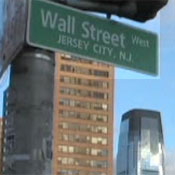
TEXT OF STORY
Kai Ryssdal: The crisis in the financial markets has had all eyes turned toward Wall Street, with the occasional long stare down at Washington DC. But it's not just Manhattan skyscrapers that're feeling the shockwaves. Over the past decade, a lot of banks and financial services companies have moved big chunks of their operations across the Hudson River. And now Jersey City is finding itself uncomfortably close to Wall Street's fault line. Sally Herships reports.
Sally Herships: It's been a tough couple of weeks for Jeremiah Healy. He's Jersey City's Mayor. When those Wall Street banks started to fail, he felt one thing...
Jeremiah Healy: Scared, when the news first came out, 'cause I started counting jobs. I said there's 3,400 jobs.
1,700 at Lehman Brothers, 1,500 at Merrill Lynch, 200 at AIG.
Healy: Now maybe 15 percent of those employees actually live in the city, but whether they live here or not, they are coming here every morning at 8:30. They go out to lunch at 12:30, they leave at 5 o'clock. That's all foot traffic. So we have all these small businesses that have evolved around that downtown area. All of those stand to be tremendously and negatively affected if those jobs went south.
Joe Panepinto:The mood there is that everybody is worried about losing their jobs. It's a high emotional time. It is fear. It's driven by fear.
Joe Panepinto Jr. manages and develops real estate downtown. His office is high in one of the glittering buildings that have sprung up along the waterfront in the last decade. Panepinto says he smelled fear in the Jersey City air when the meltdown began. But he caught a whiff of opportunity, too.
Panepinto: It's not good news, it's never good news when financial and insurance industries hit like this, but it's not necessarily as bad as everyone would think for Jersey City.
Panepinto's playing safe. Hedging, if you like. He's put one project on hold. But he's going ahead with another development.
Panepinto: Well we're real estate developers, so we always have to dream.
Herships: So there's going to be a new building?
Panepinto: Yes, even with the market the way it is.
Herships: Ground will be broken?
Panepinto: Exactly. I'll break it myself if I have to. [laughs]
Panepinto has good reason to chuckle. The cost of doing business in Jersey City is low. Especially compared to Manhattan. This crisis has brought prices down even further and lured buyers. Hazel Zoleta is a commercial real estate broker. After the news broke about the Wall Street banks, she expected business to fall off. Instead, her phone exploded as investors piled on.
Hazel Zoleta: Owners are more willing to negotiate, everything from the leases to what kind of prices they are gonna be willing to sell for. So that's why people are out there. Smart business people and smart investors and really responsible home buyers are out there. You know if it's priced reasonable, people will buy.
The shopping frenzy isn't confined to the real estate market. Crisis or no crisis, Jersey City's malls are packed. And residents are shopping up a storm. Like Hazel Zoleta's clients they're snapping up bargains as sellers cut prices to clear inventory. All this activity puts money in Jersey City's pockets, but Mayor Jeremiah Healy is still nervous. He knows how important Wall Street is to his community.
Zoleta: I do not root for any bad news for New York City. I view it not as a big brother, as a gargantuan brother. And our fates are inextricably entwined for better or worse. We want New York to boom as they have forever and then we will then also boom.
Will $700 billion do it? New York hopes so. Across the river, Jersey City has its fingers crossed, too.
I'm Sally Herships for Marketplace





